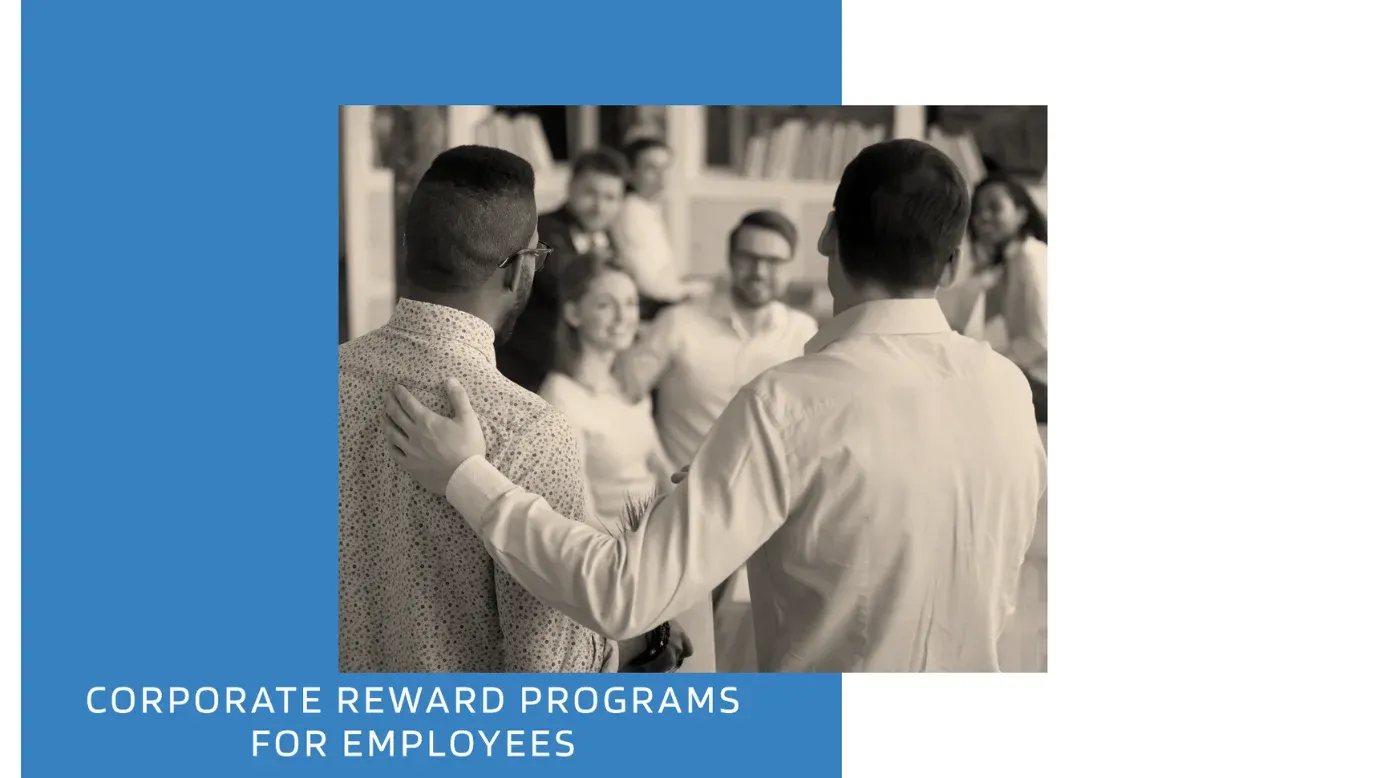On this page
In today’s competitive job market, keeping your best employees happy and motivated is crucial. One effective way to achieve this is through corporate reward programs. These programs recognize and appreciate your employees' hard work, creating a positive work environment and boosting productivity. According to a study, 69% of employees would work harder if they felt their efforts were better appreciated.
This blog will explain corporate reward programs and why they’re important. We’ll also examine the benefits these programs offer employees and businesses, and provide practical tips on creating an effective rewards program.
Employee turnover is rising, impacting businesses with higher recruitment costs, loss of knowledge, and decreased morale. Effective corporate reward programs can help reduce turnover and retain top talent.
Whether you’re in HR or a business leader wanting to improve employee morale and engagement, this blog will give you the information you need. Let’s dive in and discover how recognizing and rewarding your employees can make a big difference for your business.
What are corporate reward programs?
Corporate reward programs are like special plans made by a company to appreciate and reward its employees. These plans are carefully designed to suit different employees' likes and to bring out their best work.
They are simple gestures and thoughtful strategies to make the workplace happier and more productive. These programs often include bonuses, gifts, extra time off, or even special events to celebrate achievements. The goal is to make employees feel valued and motivated to do their best.
Benefits of corporate reward programs
- Happier employees: Such programs help to make employees happy with what they are doing since their satisfaction levels increase. This happiness can even turn the whole workplace into a happy place.
- Better work: High staff morale means that employees put in their best and this boosts the performance of a company. This eventually leads to increased effectiveness and development of the company.
- Less leaving: Satisfied people are not likely to seek new opportunities and jump ship hence reducing the cost of training new people in the organization. This can also assist in keeping a steady and seasoned team of workers.
- Teamwork: They may foster cooperation among the employees and lead to growth of better working relationships among the workers. This can result in increased creativity and greater effectiveness in solving problems.
- Good people: A company that takes good care of its workers will always attract more competent individuals as the workers of that company. This will help keep the company relevant and continue expanding the business.
- Good reputation: This has implications such that when companies treat their employees well, then they get a good reputation, which translates into increased customer flow and investment. This can lead to more business and perhaps the continued development of the company.
Creating an effective corporate rewards program
Creating an effective corporate rewards program involves several key steps. Here's a detailed guide to help you develop a program that motivates your employees and aligns with your company's objectives:
1. Define your objectives
When developing your rewards program, the initial step is to determine its goals and objectives. Do you want to increase motivation levels among employees, promote efficiency, or increase employee turnover rate? Your goals should hence be clear so that you can design the program in consultation with your needs.
2. Determine the channels for your corporate rewards program
Consider how you will deliver rewards to your employees. Will you use a digital platform like an employee recognition app or traditional methods like in-person ceremonies? Your chosen channels should align with your company culture and employees' preferences.
3. Plan the budget for your corporate reward programs
This should require setting a specific amount of money that you set aside for your rewards program and this will depend on your goals as an organization as well as the size of the business. This should be targeting the amount to be spent towards rewards together with the expenses associated with this for example in terms of administration and communication.
4. Identify performance metrics
Identify which indicators you will track to determine the effectiveness of your rewards program. These may involve the level of participation from the employees, the amount of work done within a given duration or the number of employees who remain with the company after a certain period of time. When analyzing these measures, one will be able to ascertain the effectiveness of the program in question and, therefore, make necessary changes.
5. Ensure the rewards match employees’ preferences
Think about what kind of incentives will be appealing to the most employees. Besides money the employees may respond to flexible hours of work, on the job training and any other special privileges like certificates of merit. Ensure that you have a rewards program that is suitable for your workforce.
6. Communicate effectively
Let all the employees know about the aspects of going about the rewards program. The areas that fall under this category include description of how the program is to be run, what incentives are existent for the employees, and how they could be earned. To better communicate to each member of the team, facilitate the use of email, meeting and informative posts.
7. Collect feedback and adapt
Customers who participate in the loyalty program must be asked about the program on a regular basis. It can also help you learn the areas that you have been lacking and find ways to make adjustments towards having a better workforce. That is why, it is effective to include employees in the creation of this program because that way, you can make an engaged initiative.
8. Ensure fairness and inclusivity
Ensure that your rewards program is fair and inclusive. This means equal opportunities for all employees to participate and earn rewards, regardless of their role or background. Avoid favoritism and ensure the criteria for earning rewards are clear and transparent.
Examples of effective corporate reward programs
Implementing effective corporate reward programs can significantly enhance employee satisfaction and productivity. Here are some examples of successful programs and the companies that use them:
1. Peer-to-Peer recognition programs
Peer-to-peer recognition programs allow employees to recognize and reward each other for their contributions. This not only boosts morale but also fosters a sense of camaraderie and teamwork.
2. Skill development & learning opportunities
Providing opportunities for skill development and continuous learning shows employees that the company is invested in their growth. This can lead to increased job satisfaction and loyalty.
3. Experiential rewards
Experiential rewards offer employees unique experiences rather than traditional monetary bonuses. These rewards can include travel opportunities, special events, or exclusive experiences that create lasting memories.
4. Wellness programs
Wellness programs focus on improving employees' physical and mental health, often including gym memberships, wellness challenges, and access to health resources.
5. Flexible working arrangements
Flexible working arrangements allow employees to have control over their work schedules, leading to better work-life balance and increased job satisfaction.
Case study: Greene King - employee recognition program
Greene King is a distinguished British hospitality and brewing company founded in 1799. It operates many pubs, restaurants, and hotels across the UK. Known for its extensive brewing history and a portfolio of popular beer brands, the company strongly emphasizes employee well-being and engagement.
Challenge
Greene King faced the challenge of consolidating information on all the benefits available to its 40,000 employees. The goal was to relaunch their benefits platform to improve accessibility and engagement with the company's offerings.
Solution
In response to this challenge, Greene King implemented the Bespoke Benefits Hub, designed by Terryberry. This central platform allows employees to access all their rewards, perks, and benefits information through a single, user-friendly Single Sign-On (SSO) system.
The platform was developed with extensive support from Terryberry, particularly from Ross and his team, who provided crucial advice on maximizing platform utilization and engagement. They played a significant role in designing and organizing the content in a visually appealing and user-friendly manner.
Results
The implementation of the Bespoke Benefits Hub at Greene King led to several significant outcomes, including:
- Significant increase in platform traffic: The platform receives a monthly average of 17,000 unique visits.
- Dramatic engagement uplift: There was a 600% increase in engagement following the platform's relaunch.
- High user registration: Over 33,000 employees are registered users of the platform, highlighting its appeal and utility.
- Comprehensive access: Employees benefit from having all their rewards, discounts, and well-being resources in one easily accessible location.
Conclusion
In conclusion,it is critical for companies to recognize that their success, as well as the satisfaction of their employees, can depend on effective reward programs. Understanding such programs and the advantages they have for those working in organizations make it easier for companies to build a healthy work culture.
It is essential to plan well when organizing the reward system in order to make it effective. Ensure that the program is consistent with the goals and values of your organization and make the appropriate adaptations. In this manner, you will be able to develop a mechanism that can be used to best rein in your employees.
Corporate reward programs can be helpful for businesses of any kind. Be it a tiny company or a global firm, appreciation of your employees can go a long way of making your employees more loyal, reduce on those who are planning to leave and as a result giving your business a boost.
Please bear in mind that the appropriate reward system is an addition that goes beyond being a frill, it is a wise investment into human capital. Get used to rewarding your employees, and see your establishment thrive and expand.









